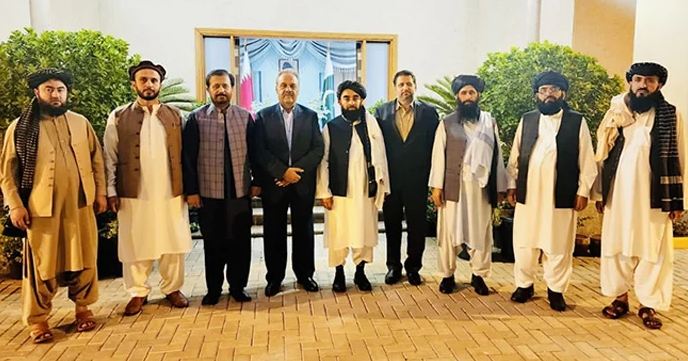DOHA, JUL 2: In a fresh diplomatic engagement after Islamabad announced an operation against Afghanistan-based terrorists, an Afghan Taliban delegation headed by Afghan interim government’s spokesperson Zabihullah Mujahid met Pakistani diplomats on the sidelines of the Doha-III conference.
Pakistan and Afghanistan enjoyed close and brotherly ties as South Asian neighbours which lately become strained due to frequent cross-border attacks largely carried out by the banned outfit — Tehreek-e-Taliban Pakistan (TTP) — which, according to Pakistan’s security officials, operates from the Afghan soil.
The Afghan interim government’s representatives are currently visiting Doha to attend talks to “discuss increasing engagement with Afghanistan and a more coordinated response to the country, including economic issues and counter-narcotics efforts”.
They were due to meet UN officials and over 20 envoys, including the US special representative to Afghanistan as the international community grappled with its approach to Kabul’s new rulers., according to Reuters.
During their visit, Pakistani Ambassador to Qatar Muhammad Aejaz hosted a dinner for the Afghan Taliban delegation at his residence in Doha which was attended by senior diplomats, including Pakistan’s Special Representative on Afghanistan Asif Durrani and the country’s Deputy Head of Mission in Kabul Ubaid Ur Rehman Nizamani.
Durrani posted photos of the occasion on X (formerly Twitter) while welcoming and hosting the Taliban representatives where they discussed developments at the “Doha-III conference, bilateral and regional issues”.
— X/@AsifDurrani20
— X/@AsifDurrani20
The Pakistani envoy to Qatar also reacted to the recent meeting on X, saying: “Very delighted to have hosted tonight the AIG [Afghanistan interim government] and Pakistan delegations attending the Doha-III [conference].”
“Both remain neighbours and brothers and have a lot in common, including a strong desire for regional peace and security,” Aejaz added.
— X/@AejazMuhemmed
— X/@AejazMuhemmed
It was an “unusual meeting” between both sides, diplomatic sources told Geo News, adding that the Taliban representatives also met an Indian delegation in Doha.
The sources said that the latest diplomatic engagement was held in a “positive environment” in which the representatives of the Afghan interim government thanked Islamabad for supporting Kabul’s stance in the Doha conference, as well as the latter’s backing on a national level.
Mujahid wrote on the microblogging website regarding the meeting, “We had a very good evening meeting with Pakistan’s special representative Asif Durrani, the ambassador and consuls in Doha.”
“We thank them for their hospitality and hope for good and constructive relations for both countries,” he added.
— X/@Zabehulah_M33
— X/@Zabehulah_M33
From a diplomatic point of view, the high-ups’ gathering from neighbouring South Asian states is an apparent move to improve relations by discussing bilateral issues.
The federal government last week approved a fresh operation — Operation Azm-e-Istehkam — a reinvigorated and re-energised national counter-terrorism drive, to eliminate terrorism from the country.
A few days back, Federal Minister for Defence Khawaja Asif, in an interview with BBC Urdu, rebuked the Afghanistan government for inaction against militants along the Pakistan-Afghanistan border, despite repeated requests made by the Pakistan government.
The defence czar, in another interview with the Voice of America (VoA), said that under Operation Azm-e-Istehkam, Pakistan could target terrorist hideouts across the border in Afghanistan. He had also dismissed the possibility of negotiations with the outlawed TTP.
Amid concerns over the impacts of the newly-launched operation, Prime Minister Shehbaz Sharif clarified that it was not a large-scale military operation and that there would be no population displacement.
During the Afghan Taliban’s rule, Pakistan had carried out intelligence-based operations (IBOs) in the border regions inside Afghanistan against terrorists belonging to Hafiz Gul Bahadur Group in March, which was responsible for the March 16 attack in Mir Ali, North Waziristan and multiple other terrorist attacks in the country.
However, the Afghan interim government strongly reacted to the “air strikes” and warned that it “does not allow anyone to compromise security by using Afghan territory”.

















